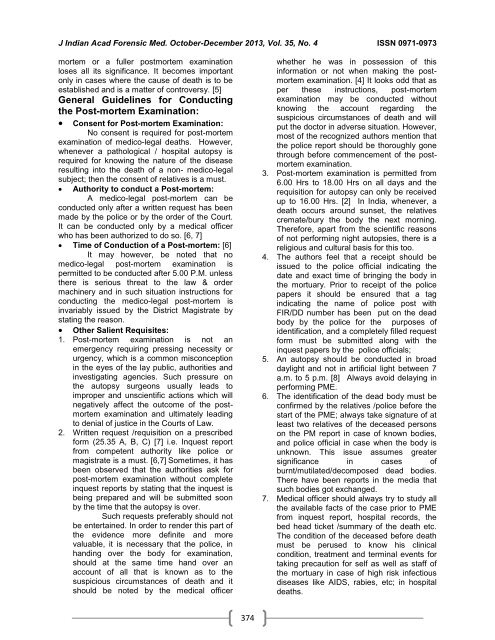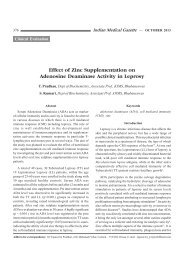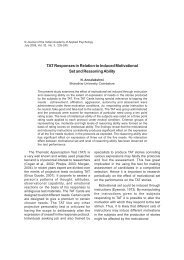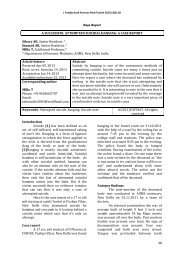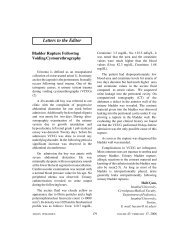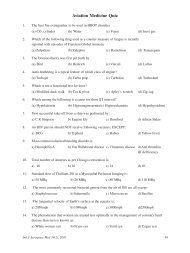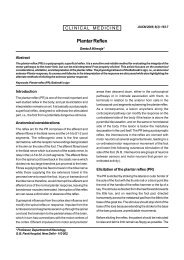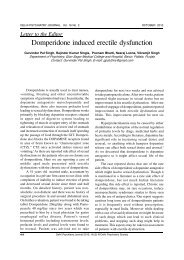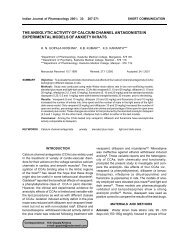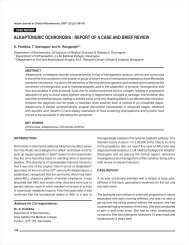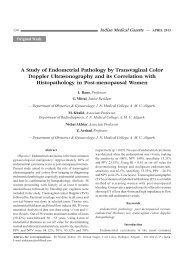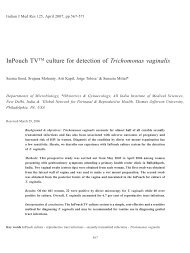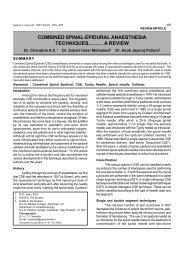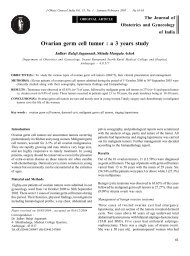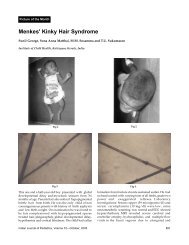Critics and Sceptics of Medico-legal Autopsy - medIND
Critics and Sceptics of Medico-legal Autopsy - medIND
Critics and Sceptics of Medico-legal Autopsy - medIND
You also want an ePaper? Increase the reach of your titles
YUMPU automatically turns print PDFs into web optimized ePapers that Google loves.
J Indian Acad Forensic Med. October-December 2013, Vol. 35, No. 4 ISSN 0971-0973<br />
mortem or a fuller postmortem examination<br />
loses all its significance. It becomes important<br />
only in cases where the cause <strong>of</strong> death is to be<br />
established <strong>and</strong> is a matter <strong>of</strong> controversy. [5]<br />
General Guidelines for Conducting<br />
the Post-mortem Examination:<br />
<br />
Consent for Post-mortem Examination:<br />
No consent is required for post-mortem<br />
examination <strong>of</strong> medico-<strong>legal</strong> deaths. However,<br />
whenever a pathological / hospital autopsy is<br />
required for knowing the nature <strong>of</strong> the disease<br />
resulting into the death <strong>of</strong> a non- medico-<strong>legal</strong><br />
subject; then the consent <strong>of</strong> relatives is a must.<br />
<br />
Authority to conduct a Post-mortem:<br />
A medico-<strong>legal</strong> post-mortem can be<br />
conducted only after a written request has been<br />
made by the police or by the order <strong>of</strong> the Court.<br />
It can be conducted only by a medical <strong>of</strong>ficer<br />
who has been authorized to do so. [6, 7]<br />
Time <strong>of</strong> Conduction <strong>of</strong> a Post-mortem: [6]<br />
It may however, be noted that no<br />
medico-<strong>legal</strong> post-mortem examination is<br />
permitted to be conducted after 5.00 P.M. unless<br />
there is serious threat to the law & order<br />
machinery <strong>and</strong> in such situation instructions for<br />
conducting the medico-<strong>legal</strong> post-mortem is<br />
invariably issued by the District Magistrate by<br />
stating the reason.<br />
Other Salient Requisites:<br />
1. Post-mortem examination is not an<br />
emergency requiring pressing necessity or<br />
urgency, which is a common misconception<br />
in the eyes <strong>of</strong> the lay public, authorities <strong>and</strong><br />
investigating agencies. Such pressure on<br />
the autopsy surgeons usually leads to<br />
improper <strong>and</strong> unscientific actions which will<br />
negatively affect the outcome <strong>of</strong> the postmortem<br />
examination <strong>and</strong> ultimately leading<br />
to denial <strong>of</strong> justice in the Courts <strong>of</strong> Law.<br />
2. Written request /requisition on a prescribed<br />
form (25.35 A, B, C) [7] i.e. Inquest report<br />
from competent authority like police or<br />
magistrate is a must. [6,7] Sometimes, it has<br />
been observed that the authorities ask for<br />
post-mortem examination without complete<br />
inquest reports by stating that the inquest is<br />
being prepared <strong>and</strong> will be submitted soon<br />
by the time that the autopsy is over.<br />
Such requests preferably should not<br />
be entertained. In order to render this part <strong>of</strong><br />
the evidence more definite <strong>and</strong> more<br />
valuable, it is necessary that the police, in<br />
h<strong>and</strong>ing over the body for examination,<br />
should at the same time h<strong>and</strong> over an<br />
account <strong>of</strong> all that is known as to the<br />
suspicious circumstances <strong>of</strong> death <strong>and</strong> it<br />
should be noted by the medical <strong>of</strong>ficer<br />
whether he was in possession <strong>of</strong> this<br />
information or not when making the postmortem<br />
examination. [4] It looks odd that as<br />
per these instructions, post-mortem<br />
examination may be conducted without<br />
knowing the account regarding the<br />
suspicious circumstances <strong>of</strong> death <strong>and</strong> will<br />
put the doctor in adverse situation. However,<br />
most <strong>of</strong> the recognized authors mention that<br />
the police report should be thoroughly gone<br />
through before commencement <strong>of</strong> the postmortem<br />
examination.<br />
3. Post-mortem examination is permitted from<br />
6.00 Hrs to 18.00 Hrs on all days <strong>and</strong> the<br />
requisition for autopsy can only be received<br />
up to 16.00 Hrs. [2] In India, whenever, a<br />
death occurs around sunset, the relatives<br />
cremate/bury the body the next morning.<br />
Therefore, apart from the scientific reasons<br />
<strong>of</strong> not performing night autopsies, there is a<br />
religious <strong>and</strong> cultural basis for this too.<br />
4. The authors feel that a receipt should be<br />
issued to the police <strong>of</strong>ficial indicating the<br />
date <strong>and</strong> exact time <strong>of</strong> bringing the body in<br />
the mortuary. Prior to receipt <strong>of</strong> the police<br />
papers it should be ensured that a tag<br />
indicating the name <strong>of</strong> police post with<br />
FIR/DD number has been put on the dead<br />
body by the police for the purposes <strong>of</strong><br />
identification, <strong>and</strong> a completely filled request<br />
form must be submitted along with the<br />
inquest papers by the police <strong>of</strong>ficials;<br />
5. An autopsy should be conducted in broad<br />
daylight <strong>and</strong> not in artificial light between 7<br />
a.m. to 5 p.m. [8] Always avoid delaying in<br />
performing PME.<br />
6. The identification <strong>of</strong> the dead body must be<br />
confirmed by the relatives /police before the<br />
start <strong>of</strong> the PME; always take signature <strong>of</strong> at<br />
least two relatives <strong>of</strong> the deceased persons<br />
on the PM report in case <strong>of</strong> known bodies,<br />
<strong>and</strong> police <strong>of</strong>ficial in case when the body is<br />
unknown. This issue assumes greater<br />
significance in cases <strong>of</strong><br />
burnt/mutilated/decomposed dead bodies.<br />
There have been reports in the media that<br />
such bodies got exchanged.<br />
7. Medical <strong>of</strong>ficer should always try to study all<br />
the available facts <strong>of</strong> the case prior to PME<br />
from inquest report, hospital records, the<br />
bed head ticket /summary <strong>of</strong> the death etc.<br />
The condition <strong>of</strong> the deceased before death<br />
must be perused to know his clinical<br />
condition, treatment <strong>and</strong> terminal events for<br />
taking precaution for self as well as staff <strong>of</strong><br />
the mortuary in case <strong>of</strong> high risk infectious<br />
diseases like AIDS, rabies, etc; in hospital<br />
deaths.<br />
374


